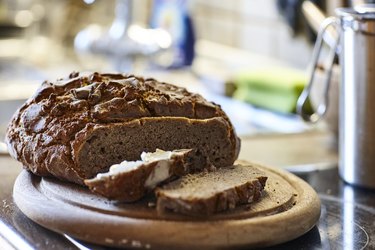
Many coffee shops hide booby-trap of breads and pastries that may not be safe to eat on a gluten-free diet. The dark-colored avo toast you're eyeing could very well be rye in disguise.
And rye happens to be one of the main grains you should avoid on a GF diet.
Video of the Day
Video of the Day
Why Rye Is Not Gluten-Free
Gluten is a protein found in wheat, barley and rye and these grains' derivatives. Therefore, rye is not gluten-free and should be avoided if you're intolerant or sensitive to gluten.
Specifically, rye contains a protein called secalin, which is a type of gluten, according to Beyond Celiac.
Rye can be found in a variety of common grain-based foods and snacks, including bread (including pumpernickel), crackers and crispbreads as well as rye beer and rye-based cereals, according to the Celiac Disease Foundation.
If you're following a gluten-free diet, you'll also want to avoid the lesser-known grain triticale, according to the Celiac Disease Foundation. A newer grain, triticale is hybrid between wheat and rye and can be found in rye-based products, too.
Hard alcohol made from rye (like whiskey) is generally safe for those with gluten intolerance to drink, as the protein is removed through the distillation process, according to Beyond Celiac.
While distilled alcohols are generally gluten-free (you'll want to double-check the bottle label nevertheless), fermented alcohol is another story.
Fermented beers, wines or hard ciders generally contain gluten unless they're specifically labeled gluten-free (more on that below), according to the National Celiac Association.
Warning
While distilled alcohol is generally safe to drink, fermented drinks usually aren't naturally gluten-free. Be sure to check the label of your alcohol for gluten-free signs or seals.
How to Find Gluten-Free Products
To safely avoid rye (or any other gluten grains), you need to pay close attention to the nutrition labels of the foods you buy or order.
Before tossing a loaf of bread or package of crackers into your grocery cart, take a look at the ingredients and allergen listing. Keep an eye out for any hidden gluten ingredients and make sure wheat and gluten aren't on the allergen section.
Once you've guaranteed the food is free of gluten ingredients, flip to the front of the package and look for a Gluten-Free label.
This mark is regulated by the U.S. Food and Drug Administration (FDA) and guarantees that the food you're buying contains less than 20 parts per million (ppm) of gluten, a generally safe amount.
In some cases, the product you're buying may have a Certified Gluten-Free seal on the package. If so, the product has been tested by the Gluten-Free Certification Organization (GFCO).
This trusted third-party uses even more stringent standards than the FDA, certifying only foods that contain less than 10 ppm of gluten, according to GFCO.
The Bottom Line on Rye
As with wheat and barley, rye is one of the main gluten-based grains so it's definitely not gluten-free.
Whether you're sensitive to gluten or just following a gluten-free diet, you'll want to avoid any breads or crackers that list rye in the ingredients.
Although rye whiskey is safe to drink due to the distillation process, fermented alcohol (like beer) is not gluten-free.
As with all other products, though, you'll want to check for a gluten-free label or seal on the packaging of the drinks or foods you purchase.